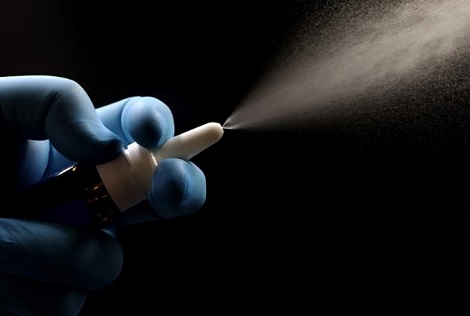Passive immunization involving avian IgY anti-H5N1 antibodies show promise against Influenza
Nikhil Prasad Fact checked by:Thailand Medical News Team Jul 19, 2024 9 months, 3 weeks, 6 hours, 30 minutes ago
Influenza News: Researchers from the Karolinska Institute-Sweden and the Swedish Veterinary Agency have made a significant breakthrough in the fight against influenza. Their recent study reveals that passive immunization using avian IgY antibodies can protect mice from influenza and allow the development of protective immunity. This
Influenza News report delves into the key findings and implications of their research.
 Passive immunization involving avian IgY anti-H5N1 antibodies show promise against Influenza
The Growing Threat of Influenza
Passive immunization involving avian IgY anti-H5N1 antibodies show promise against Influenza
The Growing Threat of Influenza
Influenza remains a major global health challenge, causing severe illness and death annually. Traditional vaccines take time to develop, leaving populations vulnerable during outbreaks. The findings of this new study provide a potential interim solution through passive immunization using avian IgY antibodies.
What is Passive Immunization?
Passive immunization involves administering pre-formed antibodies to provide immediate protection against pathogens. Unlike vaccines, which stimulate the body to produce its own antibodies, passive immunization offers direct protection. Avian IgY antibodies, derived from chicken eggs, have been shown to protect against various pathogens, including influenza.
The Study Design
Researchers Malin Eriksson, Susanne Nylén, and Kjell-Olov Grönvik conducted the study at the Karolinska Institute and the Swedish Veterinary Agency. They used male and female C57BL/6NCrl mice, which received IgY anti-H5N1 antibodies intranasally before and after exposure to H1N1 influenza A virus. The goal was to assess whether these antibodies could protect the mice from influenza and allow the development of protective immunity.
Key Findings
-Protection Against Influenza: Mice treated with IgY anti-H5N1 antibodies showed significant protection against influenza. They exhibited fewer symptoms and less lung damage compared to untreated mice. This indicates that passive immunization can be a highly effective method to provide immediate protection against influenza.
-Development of Protective Immunity: Despite receiving passive immunization, the treated mice developed influenza virus-specific memory T cells. When re-exposed to the virus 35 days later, these mice were fully protected, demonstrating that passive immunization did not inhibit the development of protective immunity. This is crucial as it shows that the immune system still learns to fight off the virus, providing long-term protection.
-Cross-Protection: The study also tested the efficacy of IgY antibodies against different strains of influenza. Treated mice were protected against severe disease and death when exposed to heterologous H3N2 influenza A virus, though they experienced slight, temporary weight loss. This finding suggests that IgY antibodies could offer broad protection again
st multiple influenza strains.
Implications of the Findings
These findings suggest that passive immunization with IgY anti-H5N1 antibodies can serve as a temporary protective measure during influenza outbreaks. This strategy could bridge the gap until vaccines become available, providing immediate protection without hindering the development of long-term immunity.
-Immediate Application: In scenarios where an influenza outbreak occurs and a vaccine is not yet available, passive immunization with IgY antibodies could be deployed to protect at-risk populations. This is especially relevant for individuals who are more vulnerable to severe influenza, such as the elderly, young children, and those with compromised immune systems.
-Long-Term Benefits: The study’s results indicate that passive immunization does not interfere with the natural development of immunity. This means that individuals receiving IgY antibodies can still develop a strong immune response to influenza, providing long-term protection once the antibodies wear off.
Future Directions
The researchers plan to explore the use of IgY antibodies in other respiratory infections and test their efficacy in different animal models. They also aim to investigate the long-term safety and effectiveness of this approach in humans. This will involve studying whether similar protective effects can be observed in human subjects and ensuring that the antibodies can be produced and administered safely on a larger scale.
Potential for Broader Application
Given the success of IgY antibodies against influenza, there is potential to apply this approach to other respiratory pathogens. This could include viruses such as RSV (Respiratory Syncytial Virus) and even new and emerging respiratory viruses, providing a versatile tool in infectious disease prevention.
Conclusion
The study demonstrates that passive immunization with avian IgY antibodies offers a promising strategy for immediate protection against influenza. This approach can complement traditional vaccination efforts, particularly during the early stages of an outbreak. The findings also suggest that this method does not interfere with the body’s ability to develop its own long-term immunity.
The study findings were published in the peer-reviewed journal: Vaccine.
https://www.sciencedirect.com/science/article/pii/S0264410X24007965
For the latest
Influenza News, keep on logging to Thailand Medical News.
Read Also:
https://www.thailandmedical.news/news/eucalyptus-extract-shows-promise-against-coronaviruses-and-influenza-viruses
https://www.thailandmedical.news/news/pateamines-new-antiviral-agents-in-the-fight-against-coronaviruses-and-even-flu-viruses
https://www.thailandmedical.news/news/herbs-and-phytochemicals-fermented-codonopsis-lanceolata-root-extract-shows-promise-against-influenza-a-virus
